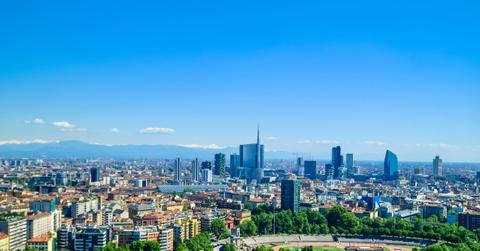Why Urban Trees Can Save Cities $500 Million Annually
The prettiest city streets are always awash in greenery. But vegetation in urban areas does more than look nice: It saves cities a ton of money—$500 million, to be exact. A new study published in the journal Ecological Modelling explains how.
Updated May 22 2019, 9:07 a.m. ET
The prettiest city streets are always awash in greenery. But vegetation in urban areas does more than look nice—it saves cities a ton of money; $500 million, to be exact. A new study took an in-depth look at 10 megacities and discovered that urban trees trap runoff, cut wind speeds and energy expenses, and absorb pollution that contributes to healthcare costs. More good news: There's still room to grow. The findings, published in the journal Ecological Modelling, break the whole thing down.
Trees are more than just a beautiful sight.
Megacities—urban areas containing at least 10 million people—are a form of nature. They’re responsible for hosting around 10 percent of all humans on the planet. And an ecosystem bearing that much load needs to be maintained. That’s where trees come in: They cut down on wind speeds, lower temperatures, absorb carbon dioxide, and enhance property values. There have even been studies linking increases in green space to less city violence.
The economic impact of trees was lesser known, however, until now.
Tree cover shakes out to a savings of $35 per person.
For the study, researchers from the SUNY College of Environmental Science and Forestry (ESF) and Parthenope University of Naples studied 10 megacities around the world: Beijing, China; Buenos Aires, Argentina; Cairo, Egypt; Istanbul, Turkey; London, Great Britain; Los Angeles, United States; Mexico City, Mexico; Moscow, Russia; Mumbai, India; and Tokyo, Japan. Noted for each city were rates of air pollution, storm water, building energy, and carbon emissions. Part of the research was done using i-Tree Canopy, a tree-cover estimator tool that utilizes Google Maps aerial photography to conduct a cover assessment within a project area.
Their findings suggest that trees have a per-city economic benefit of roughly $505 million annually. That’s $1.2 million per square kilometer, or $35 per person.
In megacities, tree cover currently accounts for anywhere between 8.1 and 36 percent of the metropolitan area. But there’s plenty of room to plant more: Potential tree cover ranges from 15.6 to 24 percent.
“Planting more trees in potential tree cover areas could nearly double the benefits provided by the urban forest,” the study’s lead author, Dr. Theodore Endreny of ESF, writes. "Megacities can increase these benefits on average by 85 percent. If trees were to be established throughout their potential cover area, they would serve to filter air and water pollutants and reduce building energy use, and improve human well-being while providing habitat and resources for other species in the urban area."
Trees save cities on healthcare, energy, and stormwater runoff costs.
Noted benefits of tree cover in the cities studied include a noted reduction in air pollution and carbon dioxide emission, stormwater runoff, and energy costs for heating and cooling buildings. In their leaves, trees can catch airborne particulates that can harm respiratory systems.
"Placing these results on the larger scale of socio-economic systems makes evident to what extent nature supports our individual and community well-being by providing ecosystem services for free," one of Endreny's co-authors, Professor Sergio Ulgiati of University Parthenope of Naples, Italy, told ESF. "A deeper awareness of the economic value of free services provided by nature may increase our willingness to invest efforts and resources into natural capital conservation and correct exploitation, so that societal wealth, economic stability and well-being would also increase.”
